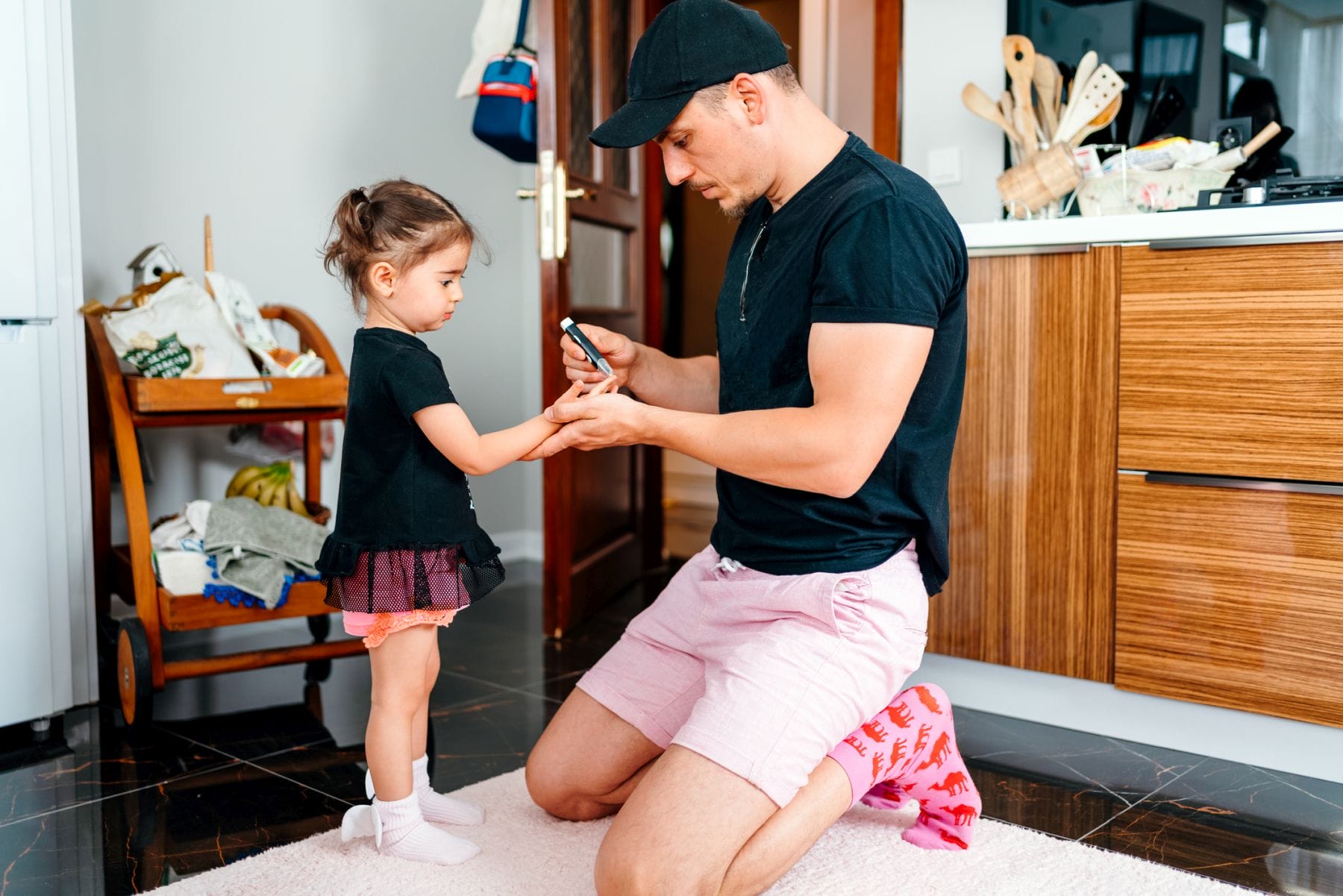Receiving a diabetes diagnosis for your child can be a life-altering moment. The whirlwind of emotions – shock, fear, and uncertainty – may leave you feeling overwhelmed. It’s essential to acknowledge and process these feelings.
Understand that it’s perfectly normal to have a range of emotions during this period. Remember that you’re not alone in this journey; many parents have faced similar challenges and come through successfully.
MyHealthcare Clinic has put together this helpful guide to help parents understand how to deal with children’s diabetes and what the next steps should be.
Your Reaction When Your Child is Newly Diagnosed
The moment you learn about your child’s diabetes diagnosis can be one of the most challenging experiences a parent can face. The shock and anxiety that accompany this news are entirely understandable.
It’s important to grant yourself the time and space to react and express your emotions. If you need to – reach out to a counsellor or mental health professional to help work through your emotions so that you can get yourself ready to take the next action steps.
When You’re Ready, Take These Steps
Once you have processed the diagnosis, you need to be ready to take the necessary next steps to help your child with the required lifestyle changes. This can be challenging as it will not only affect your child but the family as a whole. We encourage you to:
- Seek information: Knowledge is power. Educate yourself about diabetes and how it affects children. MyHealthcare Clinic and reputable sources provide reliable information to help you understand the condition.
- Consult with experts: Work with our skilled doctors who specialise in paediatric diabetes. They can explain the condition, treatment options, and what to expect.
- Lean on support networks: Connect with other parents who have gone through the same experience. Joining support groups or online communities can provide a wealth of knowledge and emotional support.
Coping With The Stress Of A Diabetes Diagnosis
Managing the stress associated with your child’s diabetes diagnosis is crucial for your well-being and your ability to support your child effectively. It will be important for you to:
- Get enough sleep: Adequate rest is vital. It not only helps you manage stress but also ensures you have the energy to care for your child effectively. Set a regular sleep schedule and consider sharing nighttime care duties with a partner or family member.
- See your friends: It’s easy to become consumed by your child’s diagnosis, but don’t isolate yourself from your support network. Spending time with friends can provide a much-needed emotional outlet and a sense of normalcy in your life.
- Find a community: Joining a community of parents with children facing diabetes can be an excellent source of support. These communities often provide valuable insights and share experiences. Online forums and local support groups can help you connect with others facing similar challenges.
Looking After Your Other Relationships
Your child’s diabetes diagnosis will have an impact on the family dynamics and interpersonal relationships. Managing these relationships will be important to help everyone adjust.
Your Partner
Open and honest communication with your partner is essential. Sharing your concerns and fears is a crucial aspect of navigating this journey together. This is a shared journey, and working as a team is vital.
Consider dividing responsibilities to ensure both partners are actively involved in your child’s care. Offering emotional support to each other not only strengthens your relationship but also provides a stable foundation for your child.

Helping Siblings Cope With a Diabetes Diagnosis
It’s crucial to consider the impact of your child’s diagnosis on siblings. This experience can be confusing and challenging for them as well.
- Open communication: Encourage open conversations with siblings about the diagnosis. Use age-appropriate language and explanations, so they understand the situation.
- Involve siblings: Whenever possible, involve siblings in their brother or sister’s care. This can help them feel included and provide a sense of responsibility.
- Offer emotional support: Pay attention to your other children’s emotional needs. They may have their own concerns and anxieties related to their sibling’s condition. Make sure they feel heard and supported.
Balancing Your Career and Being a Carer
Balancing your career with caregiving can be a complex task. It’s important to discuss your situation with your employer and explore flexible options. Many workplaces offer support, such as flexible working hours or remote work arrangements, to help parents manage their responsibilities effectively.
Setting Age-Appropriate Expectations
Understanding how to care for your child’s diabetes varies with age:
- Under Age 3: For children in this age group, caregivers typically handle all aspects of care. It’s a period of intense monitoring and caregiving.
- Ages 3 To 7: Begin introducing your child to their condition in simple terms. They can learn about the importance of medication, blood sugar monitoring, and a balanced diet.
- Ages 7 To 12: Encourage your child to take on more self-management responsibilities while maintaining parental oversight. Teach them to recognise the signs of low or high blood sugar and how to respond.
- Ages 13 To 18: Adolescence is a time when children seek greater independence. Foster responsible self-care while providing parental guidance. Encourage them to take ownership of their diabetes management, from meal planning to insulin administration.

Ask for Emotional Support
You don’t have to navigate this journey alone. It’s entirely okay to ask for help and lean on your support network. Seeking emotional support is a sign of strength, not weakness. Discuss your feelings with friends, family, or professionals who can offer guidance and a listening ear.
Conclusion
Coping with your child’s diabetes diagnosis is a journey filled with challenges, but with the right support and strategies, you can empower your child to lead a happy, healthy life. MyHealthcare Clinic is here to provide expert care and guidance for your child’s diabetes. We understand the complexities of childhood diabetes and are committed to assisting your family every step of the way.
Choose MyHealthcare Clinic for Children’s Diabetes Care
At MyHealthcare Clinic, we are dedicated to providing compassionate care for children with diabetes. Our team of experienced healthcare professionals is well-equipped to help you and your child manage this condition effectively. With a focus on your child’s well-being and your peace of mind, we offer comprehensive diabetes care and support.
Contact us to book your appointment for assistance in helping you cope with and manage children’s diabetes care.
FAQs
Read more of our most commonly asked questions regarding diabetes in children:
Common symptoms of childhood diabetes include increased thirst, frequent urination, unexplained weight loss, fatigue, and changes in mood or behaviour. If you notice any of these signs in your child, consult our doctors promptly.
As your child matures, it’s essential to gradually involve them in their care. Teach them about their condition, foster independence, and provide guidance as they learn to manage their diabetes effectively.
Childhood diabetes, specifically type 1 diabetes, affects about 1 in every 300 to 500 children and adolescents globally.
Type 1 diabetes is an autoimmune condition, while type 2 diabetes is often linked to lifestyle factors like poor diet and physical inactivity. Both require different management and treatment.
Potential complications include eye problems, kidney disease, nerve damage, and an increased risk of cardiovascular issues. Proper management can prevent or minimise these complications.
Yes, with proper care and management, a child with diabetes can lead a relatively normal and healthy life. The goal is to maintain blood sugar levels within a target range through various strategies, allowing them to live actively and fully. MyHealthcare Centre provides expert guidance and support for your child’s well-being.
